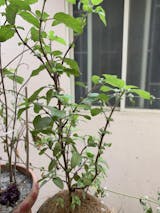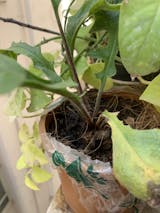Madagascar Dragon Tree
Dracaena Marginata houseplants can be used as table plants or floor bushes, they are especially impressive as tall trees with multiple canes and hundreds of long thin green leaves trimmed in dark red. The canes of Dracaena Marginata houseplants are often thick, twisted, and woody, making them a desirable and expensive specimen plant. Dracaena Marginatas, or Dragon Tree are easy-care durable houseplant wells suited for offices and homes
Origin: Tropical East Africa
Height: Grows slowly but can reach 6 ft (1.8 m)
Light: Dracaena Marginata houseplants prefer medium light, but survive in lower light situations. Lower light slows down the growth rate of the plants and reduces the size of new leaves. Direct sun burns the leaves of the plant.
Water: Over- watering causes root-rot and is the main reason for the plants to die. Water the plant well and don't water again until the top 50% of the soil is dry. In low light, it could take up to three weeks for the soil of a Dracaena marginata to dry out. Brown tips on the leaves of the plants indicate over-watering or too much fluoride or salt in the water. Numerous yellow leaves means the plant needs more water.
Humidity: Basic household humidity is fine for Dracaena Marginata plants..
Temperature: Growth may cease completely below 70 F, but will resume when warmer weather returns.
Soil: Dracaena plants grow well in a loose fast-draining soil. Any good potting mix that drains well.
Fertilizer: During growing, fertilizer with slow-release fertilizer or use a 20-20-20 liquid fertilizer at half-strength every month. Iron deficiency can result in yellowing leaves between the veins treat with an iron drench.
Pests: They are susceptible to thrips and mealybugs.
Pruning: If the canes of a Dracaena Marginata plant become long and bare at the bottom, cut the cane back to where you would like to encourage new growth. Several new stems eventually emerge below the cut and your Dracaena Marginata plant looks even more interesting.
Eliminates: Their large, dark leaves suck up ammonia, formaldehyde, toluene and xylene
Caution: Dracaena plants are not considered poisonous to humans, but are extremely poisonous to dogs and cats with a #2 toxicity level.





















